Sections
FOSSI supports students majoring in science, technology, engineering, and math (STEM) at Historically Black Colleges and Universities (HBCUs).
They come from 110 high schools in 28 different states. They aspire to be engineers, scientists, and computer programmers. They have a collective GPA of 3.79 and may one day change the world. They are the inaugural class of FOSSI scholars.
FOSSI, which stands for the Future of STEM Scholars Initiative, is a collaboration between the American Chemistry Council (ACC), The Chemours Company, the HBCU Week Foundation, and the American Institute of Chemical Engineers (AIChE). FOSSI is dedicated to diminishing the barriers for students majoring in science, technology, engineering, and math (STEM) at Historically Black Colleges and Universities (HBCUs).
In August 2021, FOSSI announced their inaugural class of 151 FOSSI scholarship recipients. These 151 scholars were chosen from more than 1,700 applicants. They will be attending 26 HBCUs and majoring in 17 different STEM majors, including chemical engineering, biology, chemistry, and computer science, among others.
FOSSI is dedicated to supporting students who would otherwise not have access to a STEM education. Each scholar will receive $40,000 ($10,000 per year for four years of undergraduate education), as well as mentoring, eLearning and professional-skills workshops, and internship opportunities with program sponsors. The funding for the scholarships is provided by more than 40 industry stakeholders, including companies such as Dow, Chevron Phillips Chemical, Eastman, and Merck, as well as individual donors, who recognize the need to create a robust and diverse STEM talent pipeline. (For a full listing of corporate sponsors, go to https://futureofstemscholars.org/fossi.)

▲ The inagural class of FOSSI scholars includes 151 students chosen from 1,700 applicants. They will be attending 26 HBCUs and majoring in 17 different STEM majors.
Why FOSSI?
“Every company that experiences diversity, understands that diversity brings better business results. All of us who participate in a diverse workforce know that it is a better workforce,” says Mark Vergnano, Chairman of the Board of Directors for The Chemours Company. Vergnano, who is the Founding Chair of FOSSI and has been integral to its growth, is passionate about creating opportunities and pathways for underrepresented groups to enter and succeed in the chemical process industries.
The Fundamentals of Success program, developed by AIChE, will provide professional development opportunities to the scholars. During the first year of their FOSSI tenure, students will learn technical communication skills, guided by one-on-one mentoring sessions. In years two and three, students will learn about project management and critical thinking, and have the opportunity to intern at one of 43 sponsor companies. In their final year, students will learn industry-relevant skills like process safety and interviewing. Throughout their four-year journey, FOSSI scholars will be invited to networking sessions, roundtable discussions, and workshops with the sponsor companies and founding partners. Scholars will also have the opportunity to participate in AIChE’s Minority Affairs Community (MAC) programs.
“The mentoring and the internships are just as important as the scholarship money to really help [the scholars] figure out what they want to do going forward,” says Vergnano. “A lot of kids drop out after the first year of a STEM curriculum because it can be tough. Our job is to mentor and intern them for these four years to make sure they are successful.”
Initiatives like FOSSI will be critical to achieving parity in the engineering profession, engaging a broader talent pool, and embracing the future of technology in the U.S. According to Vergnano, the U.S. is facing a talent shortage in the STEM fields and companies are continually searching for ways to engage exceptional candidates. “The U.S. is going to need a million STEM roles in the next ten years. We don’t have a million students traditionally coming out of STEM majors to be able to fill that need. So, it is important to tap into the underrepresented pool of students,” says Vergnano. “FOSSI is bringing students in who normally wouldn’t be aiming into engineering, and then nurturing them and guiding them successfully into industry or graduate school.”
“It’s a win for the students, but it’s a win for the industries and the companies that really need talent, and are going to thrive with diverse talent at the same time,” says Vergnano.
The origin of FOSSI
The idea for FOSSI was originally inspired by a Chemours program called the Future of Chemistry Scholarships. “The program was very much a precursor of FOSSI, where we partnered with the HBCU Week Foundation, as well as the city of Wilmington, DE, to give scholarships to underrepresented kids in the city who wanted to go to an HBCU,” says Vergnano. Even after awarding multiple scholarships in the first few years of the Future of Chemistry Scholarships program, Vergnano was already contemplating how to expand it. “We were already thinking about ramping this up in a bigger way than what Chemours could do by itself, and then the George Floyd murder happened. And the industry was trying to figure out how to respond.” The social unrest in 2020 spurred Vergnano and Chemours to approach the ACC and AIChE with the idea, and FOSSI was born.
The unprecedented collaboration between the four founding organizations — ACC, AIChE, Chemours, and the HBCU Week Foundation — is a recipe for success. According to Vergnano, ACC and AIChE were integral in getting FOSSI off the ground. Chris Jahn, the founding partner of FOSSI and the President and CEO of ACC, as well as June Wispelwey, the Executive Director and CEO of AIChE, have been driving forces behind the initiative. “AIChE is fully committed to an equity, diversity, and inclusion goal of 100% parity in the profession,” says Wispelwey. “Working with such great partners, we envision FOSSI paving the way for hundreds of students to attend HBCUs — and to become the future superstars of the chemical and process industries.”
Vergnano also credits FOSSI’s success to Ashley Christopher, the Founder and CEO of HBCU Week. “She has done a phenomenal job of making people aware of what’s important about an HBCU,” he says. “Why do kids go to HBCUs? Because they want to go to a place where they feel included, they want to go to a place that they feel comfortable. And HBCUs are not a place that a lot of our companies have tapped for talent,” says Vergnano.
Let’s hear from the scholars
The FOSSI scholars were asked to submit adjectives that others use to describe them, which ran the gamut from creative, intelligent, and motivated to caring, fun, and outgoing. Those attributes were on display in the array of video submissions that included mock interviews, music, humorous outtakes, school colors and crests, and the most frequent accessory: jubilant smiles. Watching these videos and reading their submissions could leave even the most pessimistic among us feeling positive about the future, and not to mention, wishing to attend an HBCU and be a part of this vibrant community.
This sense of community has deep roots. Ryan Young was among the scholars that credit their families with inspiring them to attend an HBCU. Like his father, Ryan is attending North Carolina Central Univ., where he is pursuing a degree in pharmacy. Likewise, Tiarra Smith comes from generations of HBCU alumni, stating that no matter the time period of their attendance, “the joy on their faces when they speak about the HBCU experience is the same. I just want to experience that joy and also continue the tradition.” She will attend Alabama A&M Univ. to major in civil engineering.

▲ Ryan Young is pursuing a degree in Pharmacy at North Carolina Central Univ., and was inspired to attend an HBCU by his family’s legacy of attendance.
The drive to be a part of a community of likeminded learners is a common theme among the FOSSI scholars. These students could pursue a STEM degree at any number of colleges and universities, but they credit an HBCU education with the additional benefit of immersing them in “an education founded in black excellence and history,” highlights Lauren Haynes. Briana Fewell was “taught at a young age that an HBCU is a tailored education for people of color.” And, Nahla Abdul-Had sees her education as a stepping stone toward her goals of being “surrounded by black people who know that they are worthy and can achieve anything that is put in front of them.”
For some scholars, an HBCU provides them with an opportunity to be a part of community they have been missing. MaKayla Ojeah explained that she has long attended schools where the students are a majority white, and she is looking forward to learning about history she may not have learned before. Nia Richardson also feels she has been missing out on the community of people that have shared similar experiences as herself.
While these young scholars are much like other teenagers, who enjoy playing sports and watching Netflix, what sets them apart is their broad interest in helping others, particularly marginalized communities. They have an understanding of the world that belies their young age. For some, this understanding comes from real-life experiences.
Arianna Pankey says her mother’s diagnosis of multiple sclerosis inspired her to pursue the medical field. “The fear and sense of powerlessness I felt as a child when my mother was diagnosed … has been replaced by an insatiable passion to be the best student I can be as I prepare for college,” says Pankey. She aspires to conduct research that will lead to the alleviation of the pain and suffering that her mother has endured, in addition to countless other families who have been impacted by various medical conditions.
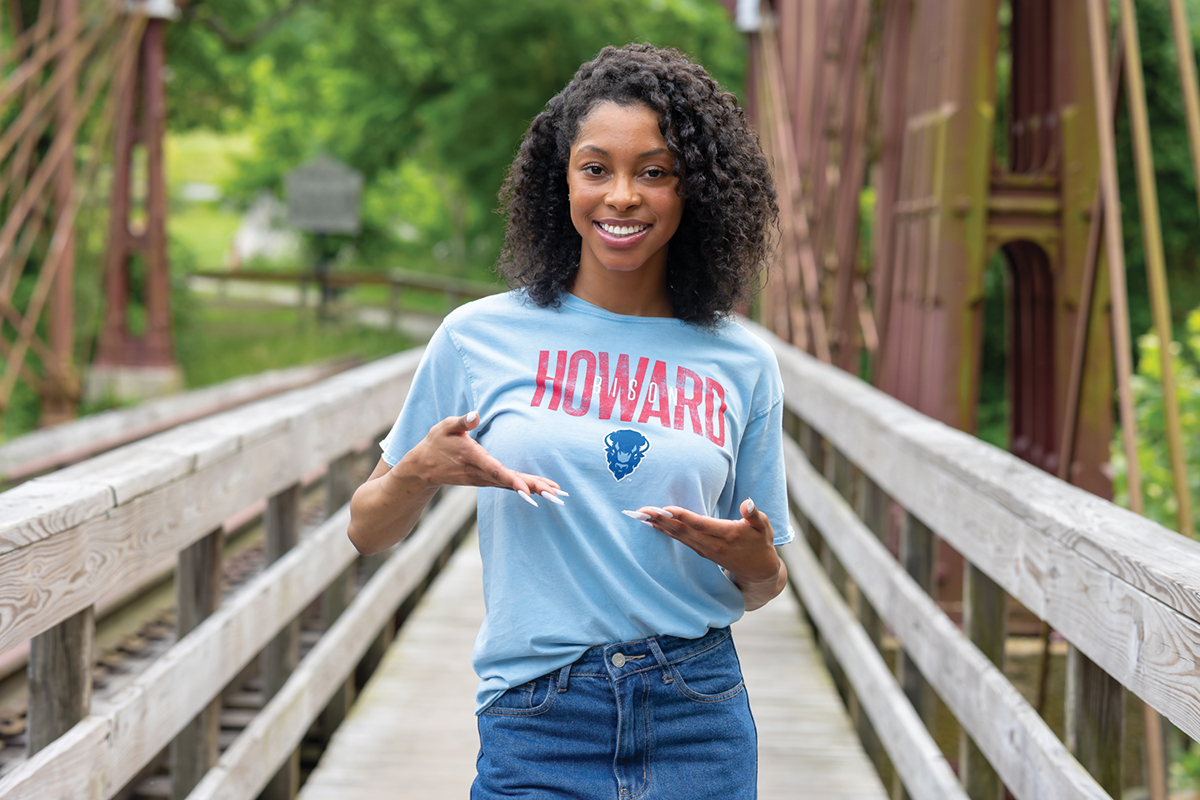
▲ Arianna Pankey is majoring in biology at Howard Univ. to begin her journey to becoming a medical doctor.
Righting disparities in healthcare is a common passion for these students. Destiny Dewar is setting her sights on the medical field to “make sure that children get the proper care they deserve no matter their race, religious belief, or gender.” Morgan Myles also plans “to advocate for equal and accessible healthcare for underserved communities.” And, Bryce Raulston hopes to expand the recognition of minorities within medicine and focus on overlooked medical conditions.

▲ Morgan Myles is attending Spelman College to pursue her goal of advocating for equal and accessible healthcare for all.
It is not just medicine where the needs of people of color are overlooked. Too often, climate change affects vulnerable populations most acutely, and sustainability efforts do little to alleviate the problem. As eloquently put by future-engineer Caitlyn Carter, “Communities with a large minority population … are often left behind in the race to save the planet and are the ones that are most affected by the repercussions of climate change … everyone deserves to live in a clean and healthy environment.” Matthew Cofer wants to make his impact on climate change by developing clean energy alternatives. “One of the best ways we can slow or stop climate change is by changing how we get our energy,” says Cofer.
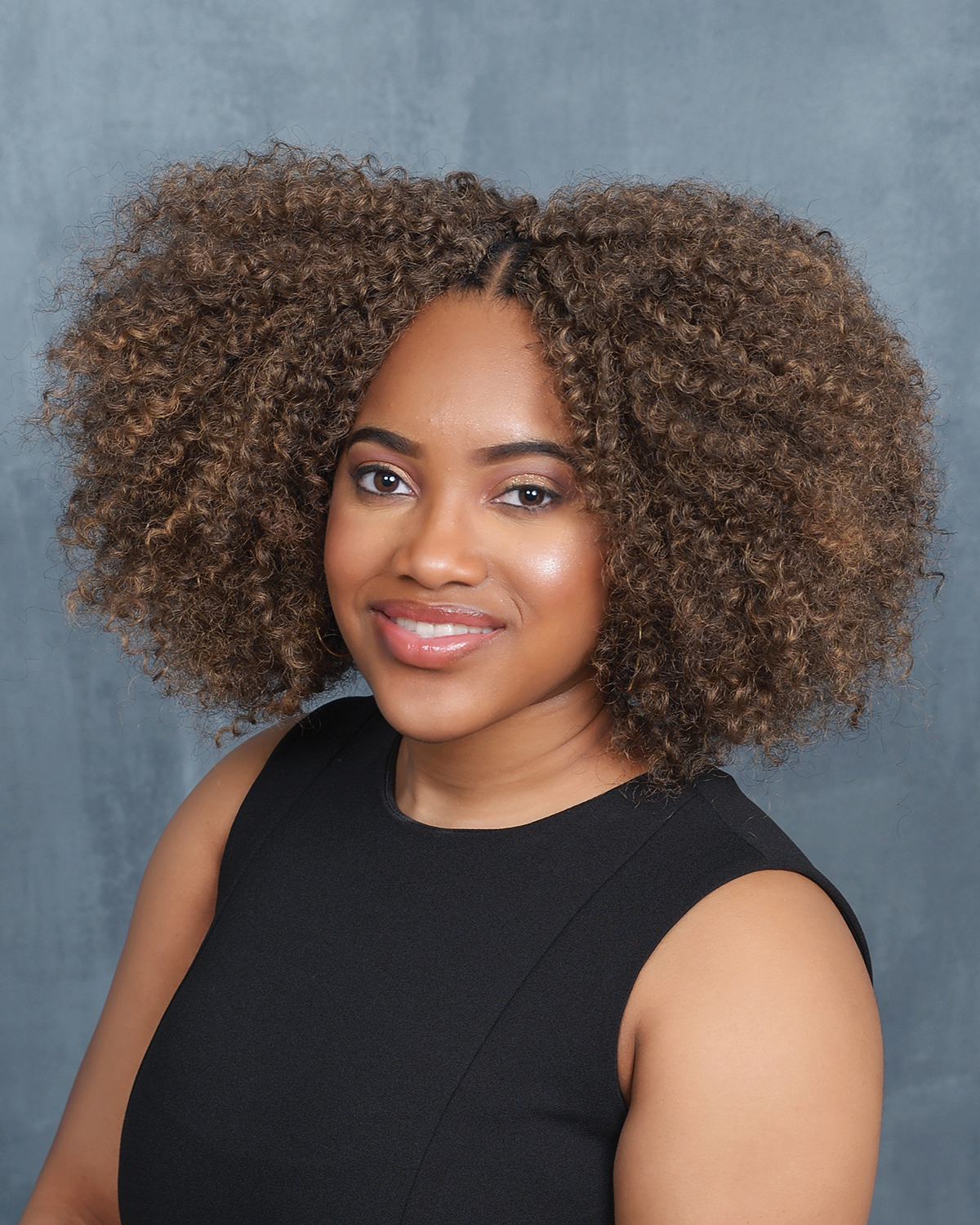
▲ Caitlyn Carter is attending North Carolina Agricultural and Technical State Univ. to engineer sustainable solutions that are affordable and accessible.
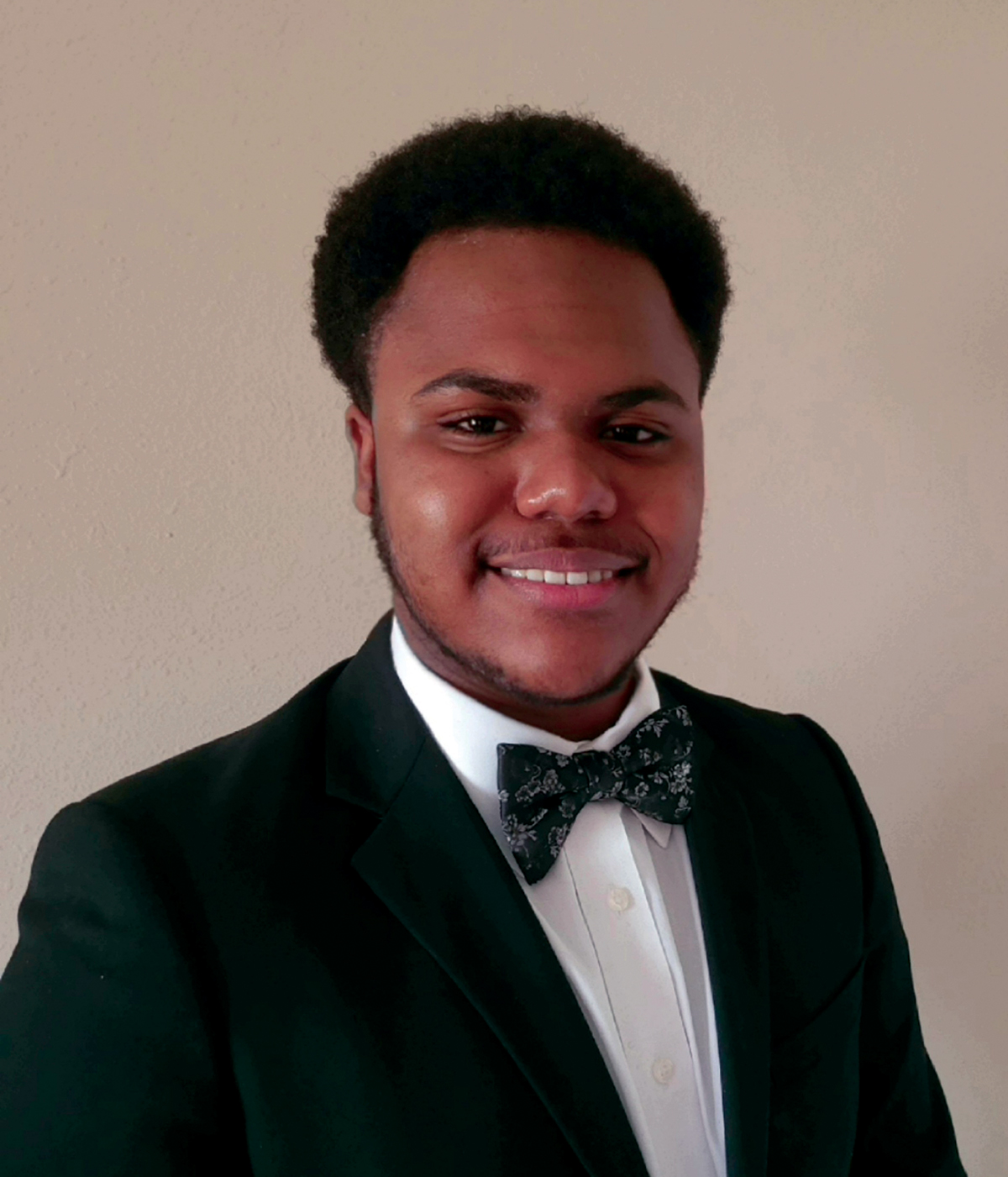
▲ Matthew Cofer is attending Howard Univ. to help address climate change by designing clean energy alternatives.
Ethan Ricks believes in the power of STEM to positively impact the planet and society. “Technology paves the way to societal progress, benefiting ordinary people from all walks of life and communities that span the globe,” says Ricks. As a software engineer, he aspires to make programs that enhance the general use of technology and solve many societal economic issues.
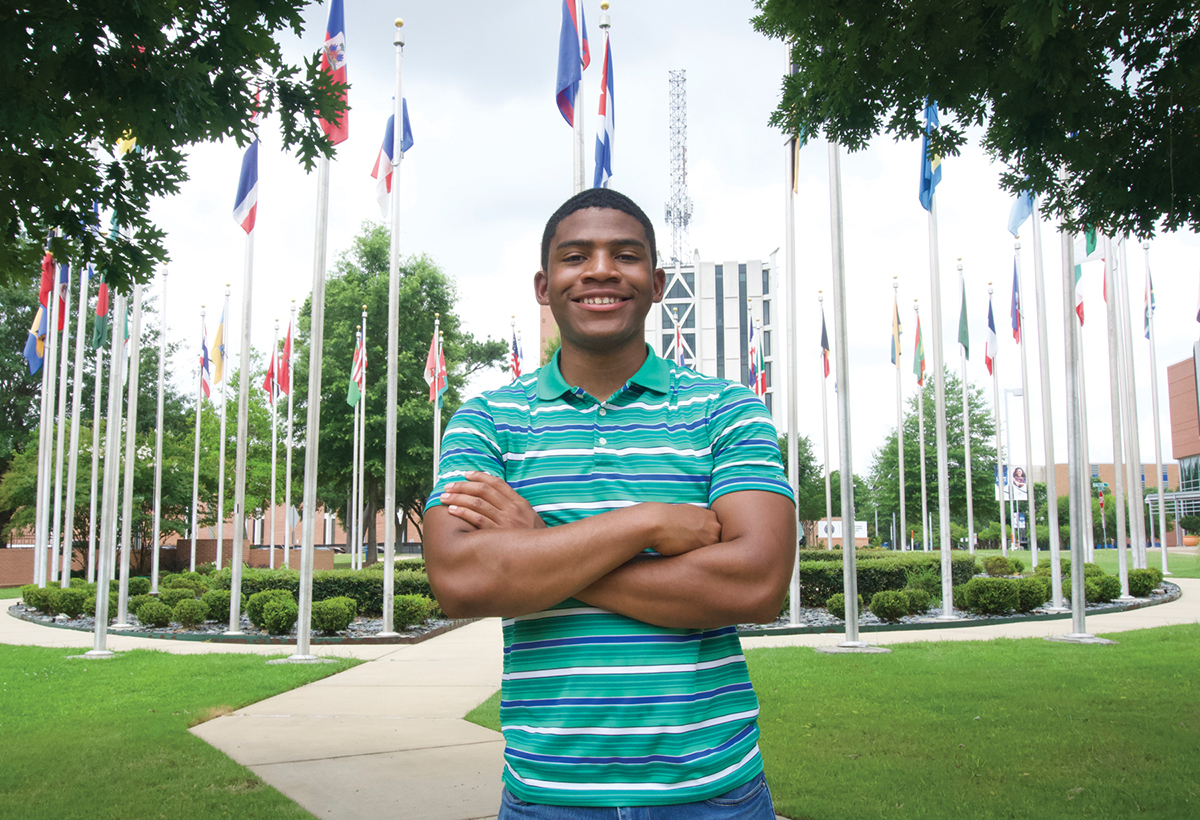
▲ Ethan Ricks is attending Jackson State Univ. for computer engineering to develop programs that improve the quality of life of people around the world.
It is heartening to know that these 151 scholars have such a clear worldview and sense of purpose. Regardless of the STEM field they pursue, their representation holds incredible power. For example, Nina Johnson knows “the importance of being a black woman in the STEM field.” She plans to earn her computer science degree, saying that achieving that objective means she faced all of the odds and was still able to accomplish her goals.
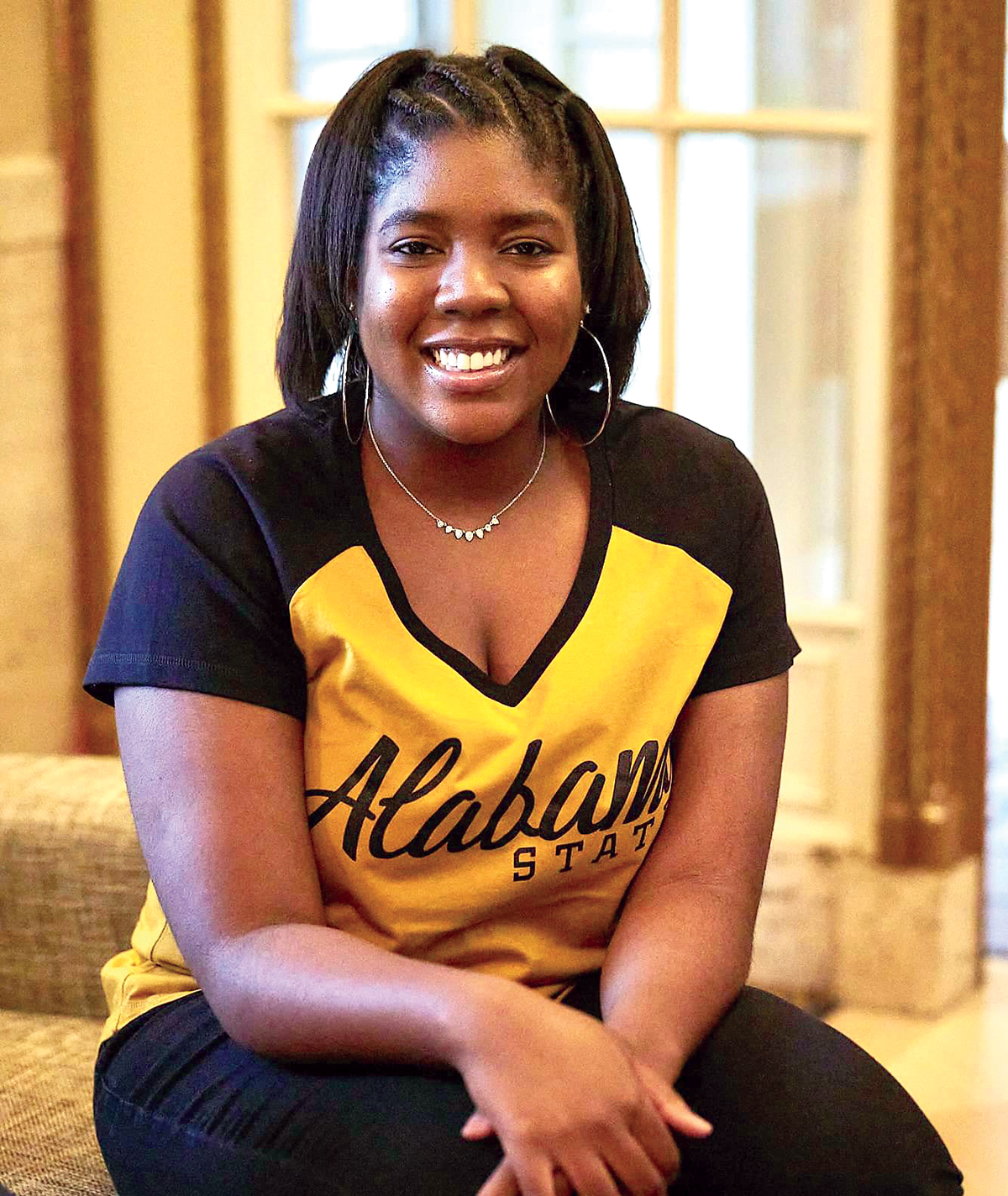
▲ Nina Johnson is attending Alabama State Univ. to earn her degree in computer science.
Unfortunately, not everyone is able to pursue their educational goals. While the value of education is hard to quantify, the cost of a university education can be tallied and the immense financial burden it places on students is no secret. Almost all of the scholars beam at the mention of the financial aid the FOSSI scholarship provides. “The debt that college comes with is what I hoped to avoid and with this scholarship it took away a barrier from pursuing a four-year college,” says Abdul-Had. Breaking the financial barrier not only benefits the students who can now pursue their dreams, but it helps to advance our society that has been limited by a STEM field that doesn’t represent the population it serves. While representation in STEM will remain a challenge, the FOSSI scholars are an important part of the solution.
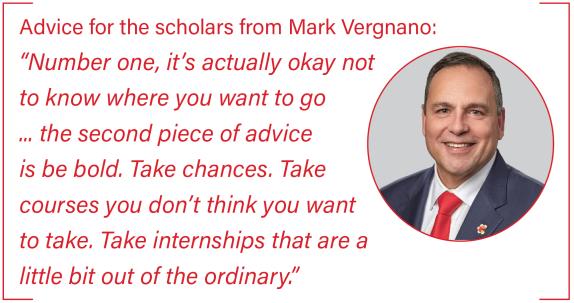
The future of FOSSI
The long-term goal of the FOSSI founding partners is to fund 1,000 scholars by 2025. That may seem like a reach — they will need to step it up to more than 200 scholarships per year — but at their current trajectory, there is a good chance they will surpass this goal.
“We want to get to 1,000 scholars, but that’s just the next milestone,” says Vergnano. His goal is for FOSSI to become an integral part of each sponsor company’s talent pipeline. “I want this to become part of the fabric of each of these companies in terms of their talent acquisition strategy.”
Vergnano hopes that more companies in the STEM fields will take note of the benefits that FOSSI can provide — both to students and to the future of industry in the U.S. — and get involved. “Don’t think of it as a philanthropic event. Think of it as a pipeline to getting the best talent out there,” he says. “We’re starting to make an impact that can benefit both these very deserving students, but also the chemical industry at the same time,” says Vergnano.
On October 1, at the annual HBCU Week College Fair in Wilmington, DE, Vergnano announced the opening of applications for the 2022 cohort of FOSSI scholars. The audience included representation from 56 HBCUs and over 5,000 high school students, parents, and school counselors, among others. The deadline for FOSSI application submissions is Feb. 15, 2022.
AIChE will be recognizing its fellow FOSSI founding partners at the 2021 “Doing a World of Good” Gala, to be held Dec. 1, 2021.
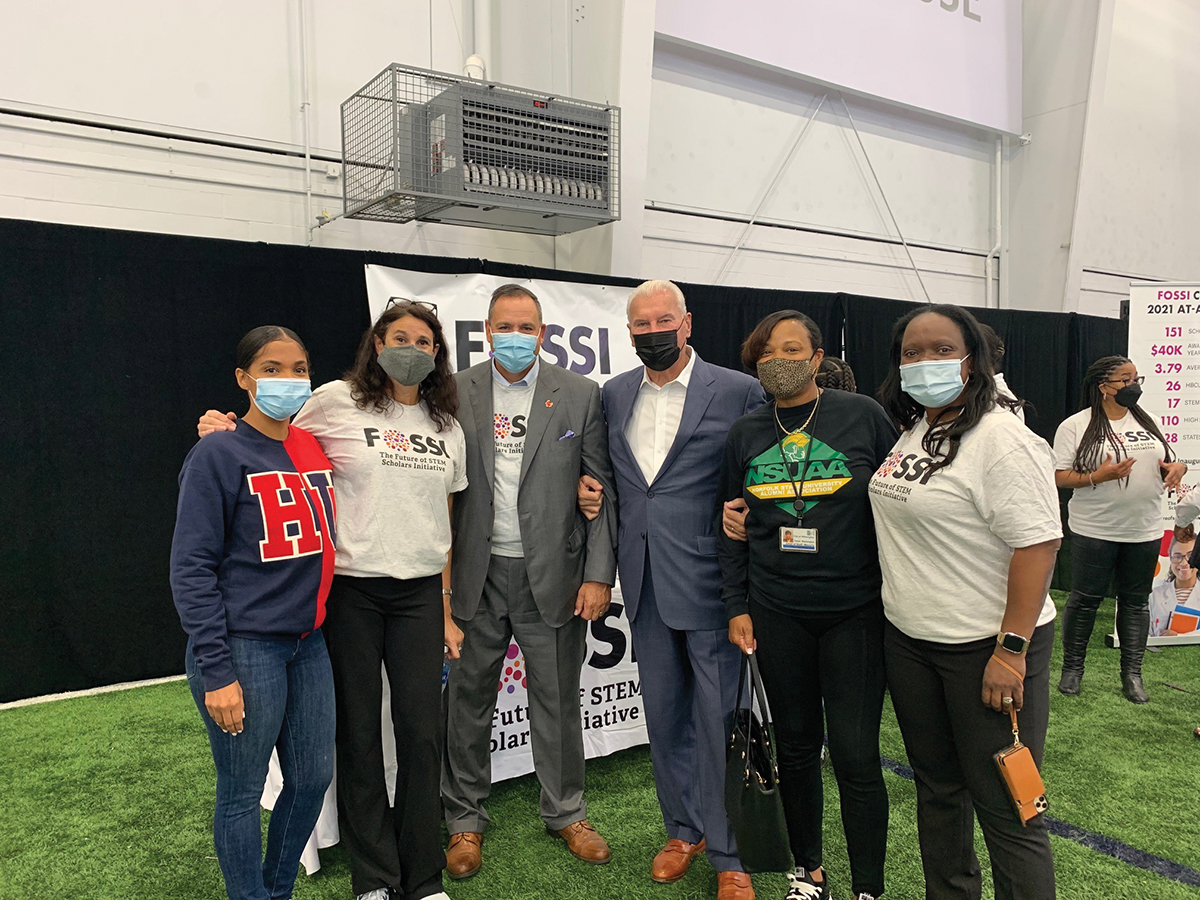
▲ Friends of FOSSI gather at the FOSSI Booth during the HBCU Week College Fair in Wilmington, DE. Pictured from left to right are: Ashley Christopher, Founder and CEO, HBCU Week Foundation; Lisa Lanzkowsky, Chief Development Officer, AIChE; Mark Vergnano, Chairman of the Board of Directors, The Chemours Company, and FOSSI Founding Chair; Mike Purzycki, Mayor of Wilmington, DE; Tanya Washington, Chief of Staff, Mayor’s Office of the City of Wilmington, DE; and Alvenia Scarborough, Senior Vice President, Corporate Communications and Chief Brand Officer, The Chemours Company
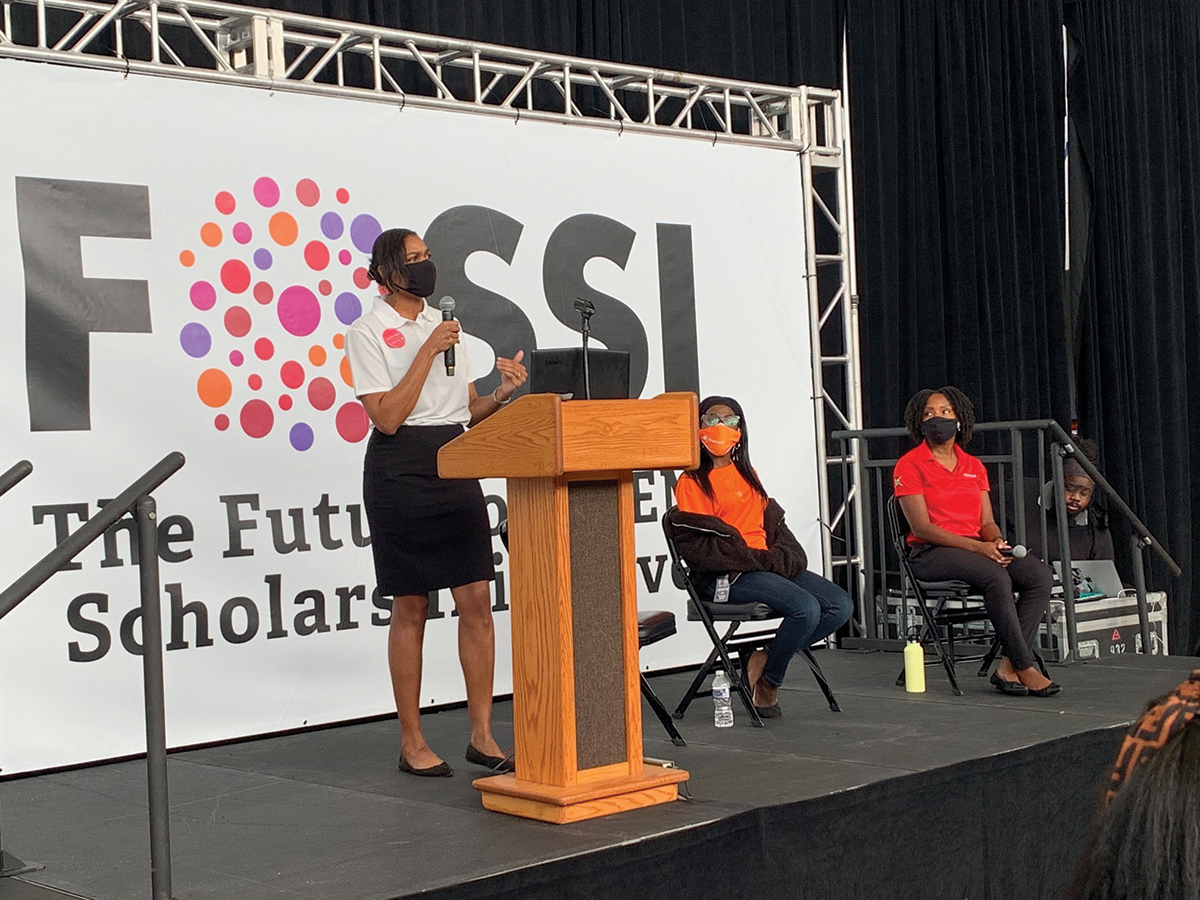
▲ At the HBCU Week College Fair in Wilmington, DE, Kimberly White of the American Chemistry Council (left) moderated a FOSSI Lunch and Learn titled, “Unleash Your Superpowers with a STEM Degree.” Panelists included Alexandra Pierre-Charles of The Chemours Company (middle) and Taylor Hines of ExxonMobil (right), who shared perspectives with more than 200 student attendees on how a STEM degree can lead to an impactful and rewarding career in the chemicals industry.

Copyright Permissions
Would you like to reuse content from CEP Magazine? It’s easy to request permission to reuse content. Simply click here to connect instantly to licensing services, where you can choose from a list of options regarding how you would like to reuse the desired content and complete the transaction.
